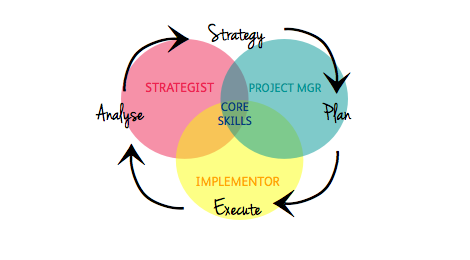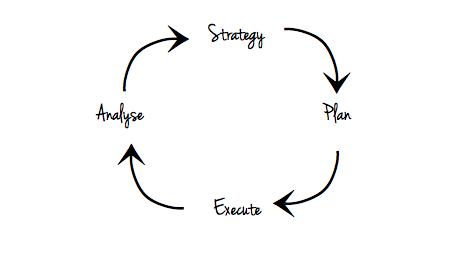I got a bit excited recently and may have over-egged my analogy when I said that marketing consultants are killing small businesses. What I was saying, in essence, is that inexperience can be extremely dangerous. I wasn’t saying that all marketing consultants are charlatans, nor that there aren’t some recent grads doing excellent freelance marketing work. The problem lies in the label – ‘marketing consultant’. It’s used so much that it’s meaningless.
Marketing is a process
Running brilliant ongoing marketing, that delivers long-term sales results, is a cyclical process of working out what to do > doing it > reviewing it, and so on.
Something like this…
I reckon there are three fundamental types of person you need on a marketing team to make this process flow. All of whom provide real value. When outsourcing these tasks for your small business, it’s getting one type of consultant to do what the other is specifically good at that causes a problem.
Which consultant for which role?
The different parts in the process need different skills, and different levels of experience. And, it is vanishingly rare to find one individual who is good at (and wants to do!) all elements. I find it useful to map three types of person against this process.  All these people will be out there selling their services as a ‘marketing consultant’ – perhaps it’s time we changed the labels:
All these people will be out there selling their services as a ‘marketing consultant’ – perhaps it’s time we changed the labels:
The Marketing Strategist
The ‘this is what to do’ people.
They have a breadth of business experience that necessarily means they’ve been doing this for some time, I’d say 10 years or more. They will have worked up the ranks and know exactly what’s needed of the other people in this whole. They have an end-to-end understanding of how people buy, and can identify where the leaks are in your new business set-up. They can quickly gauge your market and are likely to be adept at asking difficult questions. They get under the skin of your business and often help you to shape your vision. The output you’ll want from this type of person is a clear understanding of what you sell to whom and a broad outline for how you’ll meet your longer term objectives. These people will typically help you look 3-5 years ahead. Market rates for this type of consultant are in the £750 to £2,000 a day range. (Or, if you want a big-name agency or a Seth Godin type character to come in for a day to advise your business, you may be paying out on a day what some people earn in a year!)
The Marketing Project Manager
The ‘this is how to do it’ people.
Once you know who you’re selling what to, and what targets you have in mind – this person can draw you up a detailed plan. They usually have about 5 years under their belt. They’re the ones you’ll need for timelines, budgets, supplier management and that 6-12 month marketing activity plan. Market rates for this type of consultant are in the £250 to £500 a day range.
The Marketing Implementor
The ‘do it’ people.
They do the sleeves up stuff… proof-reading, scheduling, pressing the buttons… making stuff actually happen. Newbies are great in this role, so a smart graduate or someone with a year or so on their CV can be brilliant. Market rates for this type of consultant are in the £150 to £300 a day range.
So, if you’re not sure what you’re selling to whom, or you have big ambitions but you’re not sure how to reach them – call a marketing strategist. If you know exactly who you’re after and why they’d buy from you and now you need to tell them about it, call a marketing project manager. And, if you just need some extra capacity to get the stuff you know you need to do done – call a marketing implementor. But, please don’t get one to do the other!
I’ll end with a quote from Red Adair that captures what I mean superbly: “If you think it’s expensive to hire a professional to do the job, wait until you hire an amateur.”
(Oh, and there are discipline specialists that call themselves ‘marketing consultants’ too. Y’know, PR people, DM people, telesales people, etc. So, do just check a person’s portfolio to see whether they have a medium or discipline bias, as you may find that you can have any marketing technique you like, so long as it’s the one they’re good at.)
© Bryony Thomas

Bryony Thomas
Author & Founder, Watertight Marketing
Bryony Thomas is the creator of the multi-award winning Watertight Marketing methodology, captured in her best-selling book of the same name. She is one of the UK's foremost marketing thinkers, featured by the likes of Forbes, The Guardian, Business Insider and many more, and in-demand speaker for business conferences, in-house sales days and high-level Board strategy days.




Thanks for clarifying.. If only you could get the other marketing consultants to market themselves appropriately to make it simpler for us non-marketing people
Thanks Della. I’m working on it 😉
I was asked a great question by Luan Wise over on Twitter yesterday about how this works in practice for a small business. She said she fully recognised the three types of person, but asked whether businesses should therefore be using 3 consultants for each engagement.
I’d answer by saying, yes – maybe. I can see how attractive it is to simplify your life by employing just one third party to do the lot. But, generally this either means you’re paying high rates for the more basic work, or getting sub-standard strategic advice from someone who is not best suited to it. The way I’ve worked my own consulting engagements in the past 5 years is to partner with a ‘marketing project manager’ and to in-source the marketing implementation. I tend kick off the process and set the strategy, my partner consultant then takes the driving seat in making this into an action plan, overseeing a more junior marketer on the client’s payroll in getting it all done.
I’d say that these three functions need covering for a marketing operation to run smoothly. A small business needs to assess which of these skills they need, and what internal resource they have. Then they can either recruit or use an appropriate consultant for the requirement. This might, in some cases, mean using a complementary team or partnership approach. But, doing this means you get the right person for the right role. Which significantly increases your chances of getting the outcome you’re after.
I also think marketing consultants would be much better off if they identified which of these roles they’re suited to, and best at. This should be crystal clear to clients. It means, as a consultant, you do the work you most enjoy and the client’s expectations are appropriately managed. And, as a client, you pay the right rate for the right work.
You’ve hit the nail on the head Bryony. This is something we can all learn from. I freelance in PR and Communication and it’s made me think how I could pitch my work more clearly. It is so often confused with Marketing, and PR is about more than media relations too. There is so much for a business to understand when looking for the right help.
I often find that businesses ask for a certain tactic, or perhaps think they should be doing ‘something’, but an experienced ‘consultant’ will know to ask the right questions, delve deeper, ask why and uncover and define the strategy to then direct the activity. Any activity done without a clear strategy or objective is a waste of time and money.
Love reading your posts, they always set the record straight, thanks, Katie
Thanks Katie. Really glad it’s been helpful. I’m going to follow-up on ‘expert marketing suppliers’ too – which definitely includes PR in my mind. So, keep an eye out for that.
Really like the how, what, do. It is a great illustration of the roles of a marketer. I have stopped doing the do and focus on the how and what now. Love your work! Got to podcast soon.
Dan
Thanks Dan! Yes, podcasting it is. Look out for an email from me. Thank you for the nudge 🙂
Hi Bryony, I read this and shouted “Yes!” that is a great way to categorise the different skills brought by marketing consultants and a very clear way of ensuring businesses don’t bring in the skill set they don’t need.
I was about to type a long comment about how that applies to all consultants and in fact business structure itself, but decided to put it into it’s own blog. Hope it’s also a useful reference.
http://www.thewhiteapproach.co.uk/2013/06/the-three-strengths-of-a-good-business-team/
Thanks Paula. Making people shout out loud is always a goal of mine… prompting some further considered thinking in the form of a great post… even better!
Absolutely spot on Bryony! Since going ‘freelance’ myself about a year ago, (having since run my own agency) I’ve quickly stumbled upon the challenge in explaining to the people/businesses the difference between the different needs and skills required to achieve success.
Personally I probably best fall into the marketing strategist category but am frequently called upon to deliver the project manager and implementor roles too… something I’m always wary of and keen to steer away from… they ARE indeed very different roles that require completely different skills and mindsets.
If anything your post has highlighted the importance to myself in acknowledging which role I’m suppose to be delivering today, regardless of what the client expects or understands! Very helpful. Thank you.
Delighted it’s helped Ryan. I think this is about clarity and managing expectations… there’s nothing harder than trying to live up to expectations you didn’t know someone had.
Really good post Bryony. I am definitely in the first category and also have to roll up my sleeves and write copy for clients. I now mentor inexperienced marketing teams because tactics minus strategy and experience can be so expensive with many mistakes just waiting to happen. Every month I encounter a business that is knee deep in tactics without undergoing the strategic basics such as understanding and identifying their audiences, developing their compelling messages and then planning campaigns that mirror the buying process from lack of awareness to a sale and even beyond. The world needs more marketing know how for sure
Thanks for today and this link.
I’d like to reinforce the first comment on this post.
Indeed, one might ask why it isn’t mandatory in all ‘fee based’ service industries to set out your stall with some terms of business.
Greater transparency of clarity of expectations might do wonders for the marketing industry. BT being an exception of course.
If you would like to take a great deal from this post then you have to apply these techniques to
your won weblog.